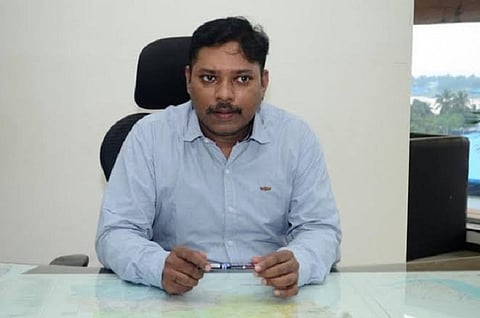

S Sasikanth Senthil, a 2009 batch IAS officer who was working as the Deputy Commissioner of Karnataka's Dakshina Kannada district, resigned from the Indian Administrative Service on Friday.
His resignation comes less than two weeks after Kannan Gopinathan, a Malayali IAS officer from the Union Territory Dadra and Nagar Haveli and Daman and Diu, resigned from the service citing the clampdown in Jammu and Kashmir following the abrogation of Article 370.
Speaking to TNM, Sasikanth explains that the current situation in Jammu and Kashmir is part of the reason for his decision to resign and that there is a "framework of fascism" developing in the country.
"You can see the framework being deployed (in the country) and it is the time-tested framework deployed in many countries in history. The situation in Kashmir is part of this framework. A month-long clampdown of an entire state is unheard of in India and it tells you that something is fundamentally wrong," says Sasikanth. He clarified that his decision was not connected to an issue in his administrative work in Dakshina Kannada.
'No space for rational debate'
He, however, feels that there is no space for rational debate in the country and that debates tend to become a question of one's nationalism. "One of the tenets of a fascist framework is to replace rational debate with hyper-nationalism. The moment you start a debate, the third argument invariably will be whether you are an anti-national. This brings in the question of your loyalty to the nation. If people are not shown that this is part of a larger framework, they will never understand why someone is debating. It is important for the media, free press and bureaucracy to debate this," he says.
When asked whether it is possible for bureaucrats to separate the ideology of the political party in power from their own functioning, Sasikanth replies that the differences in ideology cannot go beyond the spirit of the Constitution. "Our country is built upon values enshrined in our Constitution. It is a broad understanding that there might be differences in ideology but that cannot be beyond the spirit of the Constitution. We are supposed to implement policies within the framework of Constitutional values. When something is right according to the letter of the law but it does not stand the test of the spirit of our Constitution, then it is wrong," he says.
Sasikanth served as the Deputy Commissioner of Dakshina Kannada for almost two years, starting in October 2017. An engineer by profession, Sasikanth quit his job in a reputed company to join the civil services in 2009.
Managing communal conflict in Dakshina Kannada
During his years in the civil service, Sasikanth earned a reputation for being a no-nonsense bureaucrat and was admired by his peers for his fairness in administration. He served in Shivamogga, Ballari, Chitradurga and Raichur districts before he was tasked with administrating the communally sensitive Dakshina Kannada district. In the two years since Sasikanth took over, statistics show that incidents of communal violence have decreased in the district. Sasikanth believes that it is because of the action of the district administration in cutting down the supply of funds to groups fuelling communal violence..
"We managed to cut down the funds supplied to groups engaged in communal violence. This was achieved by restricting illegal sand mining in the district since the two are linked. We also held meetings with members of different religious groups and they often respond to fairness in administration. It is when a group believes that the administration is unfair to them, a law and order problem occurs," he says.
According to the numbers, there were 42 cases and 6 incidents of communalism in Dakshina Kannada in 2017. In 2018, it came down to 3 cases and 3 incidents while 2019 has so far seen 4 cases and 3 incidents.
Earlier this year, an online sand booking and monitoring system for delivering sand (www.dksandbazaar.com) was launched by the district administration. Sasikanth is also credited with hosting the first Mangaluru River Festival in January 2019 to promote the riverbank as an eco-friendly tourist attraction. He adds that the next step for Mangaluru would be to achieve zero waste management and the plan to achieve this will be implemented in the next six months.
But 10 years after entering the civil services, he says that he finds the state of public affairs 'genuinely worrying' and that for him to stand up and say something about it, he has had to leave the civil services. "The pattern is very clear to me and I will be working outside of the bureaucracy to inform the common public about this with clarity. But, there is no question of joining politics since I belong in the academic field," he adds.